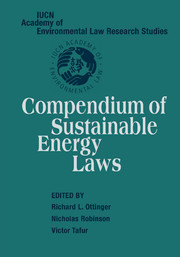Book contents
- Frontmatter
- Contents
- Acknowledgments
- Introduction
- I WORLD ENERGY ASSESSMENT
- II INTERNATIONAL AGREEMENTS
- III INTERNATIONAL LAW DECLARATIONS AND OTHER SOFT LAW INSTRUMENTS
- Universal Declaration of Human Rights
- Millennium Declaration
- Stockholm Declaration of the United Nations Conference on the Human Environment
- Declaration on the Right to Development
- World Charter for Nature
- Rio Declaration on Environment and Development
- The Earth Charter (As endorsed by UNESCO and IUCN)
- IV ACTION PLANS AND MULTILATERAL OPERATION RECOMMENDATIONS
- V SELECT REGIONAL INTERNATIONAL ENERGY AGREEMENTS
- VI SELECT NATIONAL LEGISLATION ILLUSTRATIVE OF SUSTAINABLE ENERGY LAW INNOVATIONS
- Index
The Earth Charter (As endorsed by UNESCO and IUCN)
Published online by Cambridge University Press: 03 May 2010
- Frontmatter
- Contents
- Acknowledgments
- Introduction
- I WORLD ENERGY ASSESSMENT
- II INTERNATIONAL AGREEMENTS
- III INTERNATIONAL LAW DECLARATIONS AND OTHER SOFT LAW INSTRUMENTS
- Universal Declaration of Human Rights
- Millennium Declaration
- Stockholm Declaration of the United Nations Conference on the Human Environment
- Declaration on the Right to Development
- World Charter for Nature
- Rio Declaration on Environment and Development
- The Earth Charter (As endorsed by UNESCO and IUCN)
- IV ACTION PLANS AND MULTILATERAL OPERATION RECOMMENDATIONS
- V SELECT REGIONAL INTERNATIONAL ENERGY AGREEMENTS
- VI SELECT NATIONAL LEGISLATION ILLUSTRATIVE OF SUSTAINABLE ENERGY LAW INNOVATIONS
- Index
Summary
PREAMBLE
We stand at a critical moment in Earth's history, a time when humanity must choose its future. As the world becomes increasingly interdependent and fragile, the future at once holds great peril and great promise. To move forward we must recognize that in the midst of a magnificent diversity of cultures and life forms we are one human family and one Earth community with a common destiny. We must join together to bring forth a sustainable global society founded on respect for nature, universal human rights, economic justice, and a culture of peace. Towards this end, it is imperative that we, the peoples of Earth, declare our responsibility to one another, to the greater community of life, and to future generations.
Earth, Our Home
Humanity is part of a vast evolving universe. Earth, our home, is alive with a unique community of life. The forces of nature make existence a demanding and uncertain adventure, but Earth has provided the conditions essential to life's evolution. The resilience of the community of life and the well-being of humanity depend upon preserving a healthy biosphere with all its ecological systems, a rich variety of plants and animals, fertile soils, pure waters, and clean air. The global environment with its finite resources is a common concern of all peoples. The protection of Earth's vitality, diversity, and beauty is a sacred trust.
- Type
- Chapter
- Information
- Compendium of Sustainable Energy Laws , pp. 105 - 110Publisher: Cambridge University PressPrint publication year: 2005



